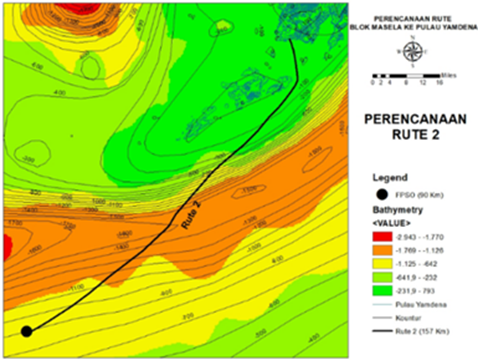Analysis of the Thickness and Stability of Subsea Pipes in the Masela Block Working Area on Yamdena Island
DOI:
https://doi.org/10.62012/zl.v5i2.35891Keywords:
Pipeline, Stability, Wall ThicknessAbstract
Submarine pipeline is a transportation or concept used to transport hydrocarbon products such as crude oil and high-pressure natural gas. The fluid material or gas is pumped from the platform across the seabed using a pipeline. The Abadi Field in the Masela Block is one of the National Strategic Projects (PSN) located in the Tanimbar Islands Regency, Maluku Province. The block was developed by INPEX Masela Ltd. It geographically borders to Timor Leste and Australia. It was discovered in 2000 and contains potential gas reserves which reaching 10.73 trillion cubic feet (Tcf). This research aims to determine the minimum thickness of submarine pipelines, determine on-bottom stability in accordance with DNV RP-F109, and visualize the maximum pressure caused by significant current flow on the pipe surface by using Ansys Computational Fluid Dynamics 2023 R2 Student Version. This research method is used a quantitative. The analysis result of this research that have been obtained, the thickness of the pipe is 11.2 mm. The calculated of on-bottom stability is 0.012 for vertical and 0.008 for lateral stability. In Additionally, by using Ansys Computational Fluid Dynamics 2023 R2 Student Version, maximum pressure of the pipe is 14 Pa.Downloads
References
Amalia, A. 2017, Integrated Evaluation of Masela Block Development Concepts. Univeritetet i Stavanger. Norway
American Petroleum Institute. 2009. Design, Construction, Operation, and Maintenance of Offshore Hydrocarbon Pipelines (Limit State Design). United States of America.
American Society of Mechanical Engineering. 2006. Gas Transmission and Distribution Piping System. United States of America.
Bai, Q., & Bai, Y. 2014. Subsea Pipeline Design, Analysis, and Installation. Elsevier. United States of America.
Bai, Y., & Bai, Q. (2011). Subsea Structural Engineering Handbook. Gulf Professional Pub. United States of America
Det Norske Veritas. (2010). Recommended Practice Det Norske Veritas As On-Bottom Stability Design of Submarine Pipelines. Oslo. http://www.dnv.com
N. S. Aulia and F. M. Assidiq, “Comparative Numerical Analysis Fatigue Damage Based On Variation In Quantities Mooring Line On Aker Smart 2 FPSO”, Journal of Maritime Technology and Society, vol. 3, no. 1, pp. 21-32, Feb. 2024.
A. E. Ramadani and F. M. Assidiq, “Analysis of The Effect of mooring Depth & Fatigue Damage on Mooring Line FPSO Ship Azurite In The Masela Block”, Journal of Maritime Technology and Society, vol. 3, no. 1, pp. 33-42, Feb. 2024.

Downloads
Published
How to Cite
Issue
Section
License
Copyright (c) 2024 Ahmad Faiq Dhiyaulhaq Karya, Juswan Sade, Fuad Mahfud Assidiq

This work is licensed under a Creative Commons Attribution 4.0 International License.
Allow anyone to modify, improve, and make derivative works, even for commercial purposes, as long as they credit to you for the original work.




























